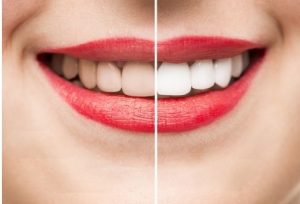
Teeth whitening is a service that we regularly get asked about. Advertisements and articles about home remedies or whitening toothpastes pop up over social media that gets more people to try it for themselves. That begs the question – do these actually work?
What do the whitening toothpastes do?
Whitening toothpastes use abrasives in the paste to remove surface stains from the teeth. Charcoal is a very popular additive that is being marketed in both commercial and home use toothpastes to remove unwanted stains and while it is common, it hasn’t been studied enough to know the effects it can have on users.
What do we know about charcoal toothpastes specifically?

- Charcoal toothpastes are known for being too abrasive on the teeth and gums which causes damage to the surface which can lead to recession and a breakdown in the enamel.
- Most do not contain fluoride which is an essential mineral that helps to strengthen tooth enamel and minimise the likelihood of decay
- The use of charcoal can cause more staining in the teeth if cracks are visible due to a build-up of the charcoal inside
- If previous dental work has been done in the mouth, like crowns, veneers, or fillings, it is possible that the charcoal can also build up in the lining of that restoration causing a grey outline
Do general whitening toothpastes have any advantages?
Yes, there are a few benefits, but that list is small.
- Due to the abrasives in the toothpaste, it can remove surface stains from the teeth
- It may also improve bad breath
- When used occasionally, it can prevent surface stains from occurring after a clean with your dentist
So, what are the disadvantages?
As mentioned above when discussing charcoal toothpastes, the abrasive nature of whitening toothpastes can affect the enamel of the teeth causing the teeth to be weakened. This can cause sensitivity and an increased likelihood of decay. Adding the fact that most whitening toothpastes do not contain fluoride, it makes this risk higher. Below are a few more disadvantages of these whitening toothpastes:
- If there are stains below the enamel, there is no way for the toothpaste to remove it
- Long-term effects on users are still unknown
What’s the best way for us to whiten our teeth?

There are ways to safely whiten your teeth. The Australian Dental Association (ADA) have a list of endorsed products that pass their criteria of standards which can be found online, or you can look for the ADA stamp on the products. These products include some whitening toothpastes, in house whitening, or at home whitening that is supervised by your dentist.
If you’re interested in getting your teeth whitened, book in an appointment with one of our dental team and they can answer any questions you may have about the services we offer, or a product that you’re looking at to make sure it is safe for you to use.
